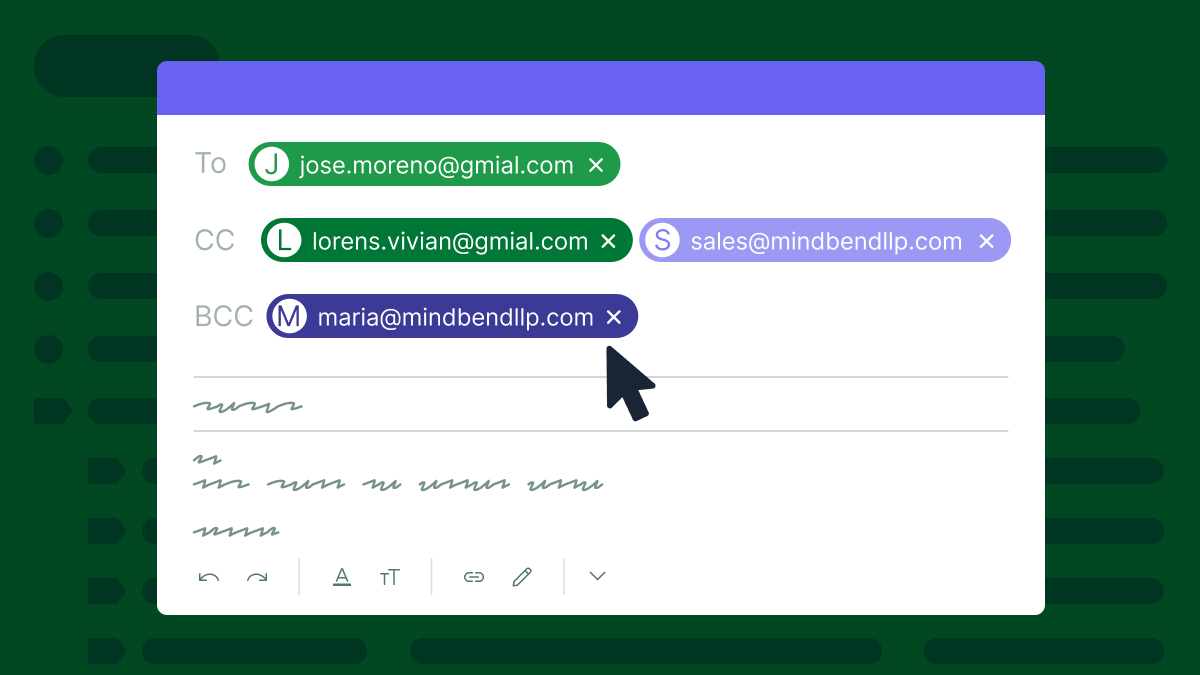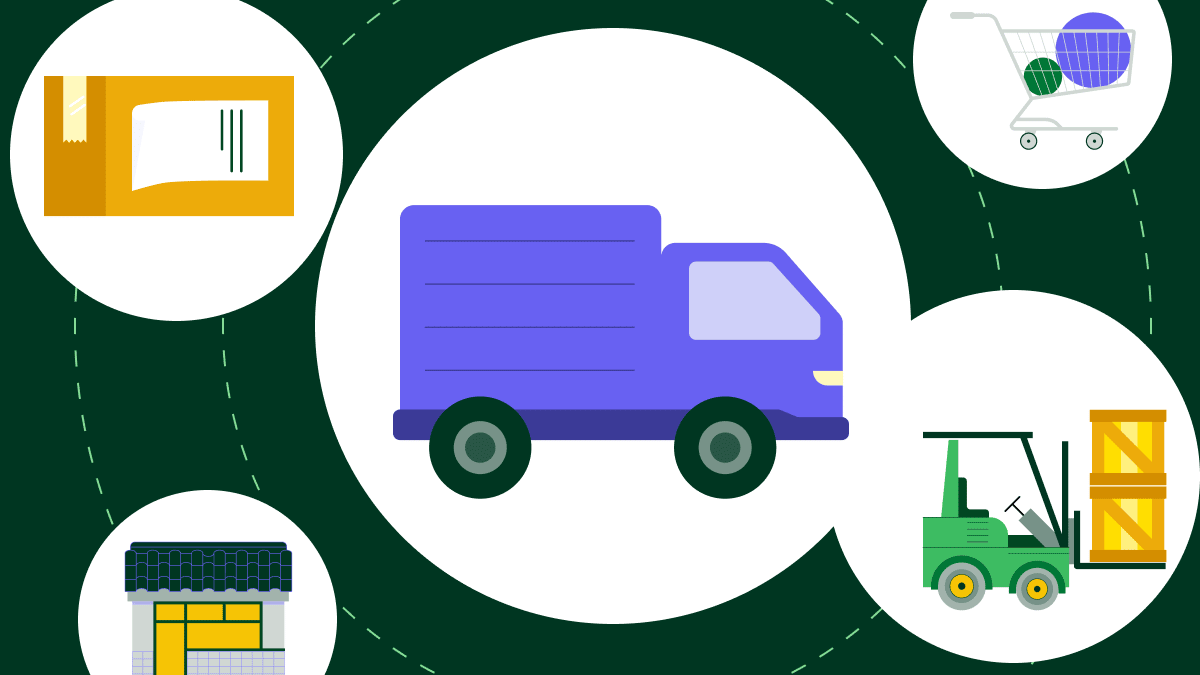Your sales team’s mindset determines how they approach challenges and overcome rejection.
A fixed mindset limits one’s potential and makes one resistant to change. A growth mindset fuels resilience, drives continuous improvement and increases success.
In this article, you’ll learn how to assess your team’s mindset and seven ways to foster a growth mindset that closes more deals and boosts your bottom line.
Key takeaways from growth mindset vs. fixed mindset
A growth mindset empowers sales teams to embrace challenges, learn from feedback and consistently improve performance.
A fixed mindset limits potential, making reps resistant to new strategies and quick to give up after setbacks.
Build a learning culture, celebrate wins and failures and incentivize activity-based selling to encourage a growth mindset.
Pipedrive helps teams put growth mindset principles into practice by streamlining processes, activity-tracking and ongoing development – try it free for 14 days.
What is a growth mindset?
A growth mindset is the belief that you can change your basic qualities – like skills, intelligence and talent – through learning, deliberate practice and hard work.
Psychologist Dr. Carol Dweck coined the term in her 2006 book, Mindset: The New Psychology of Success.

People with a growth mindset are lifelong learners. They embrace challenges as opportunities, seek constructive criticism and see failure as essential to growth.
Common traits of salespeople with growth mindsets:
- Experiment with new outreach approaches
- Read books and go on courses to develop their skills
- Treat objections as a chance to improve their know-how
- Seek out mentors, feedback and other learning processes
- Consider lost deals as learning opportunities
If your sales team has a growth mindset, they’ll be more resilient, agile and better problem solvers than a similar team with a fixed mindset.
What is a fixed mindset?
A fixed mindset is a belief in innate talent and unchangeable fixed traits.
Dweck’s research finds that people with fixed mindsets stay in their comfort zone. They avoid challenges, take criticism personally and see failure as a reflection of their ability rather than effort.
Common traits of salespeople with fixed mindsets:
- Reject new sales strategies
- Avoid professional development
- Let rejection impact their well-being
- Blame other factors for failure
- View others’ success as a threat rather than inspiration
If your sales team has a fixed mindset, they’ll find it tough to overcome objections, adapt to changing markets and meet quotas.
To make the difference clearer, it helps to see how sales reps with each mindset react in different scenarios.
What’s the difference between a growth mindset and a fixed mindset in sales?
Success is often the most stark difference between sales reps who believe in self-improvement and those who believe in fixed natural talents.
Research by TalentLMS finds that 80% of senior US executives believe employees with a growth mindset deliver tangible business benefits, including revenue growth.
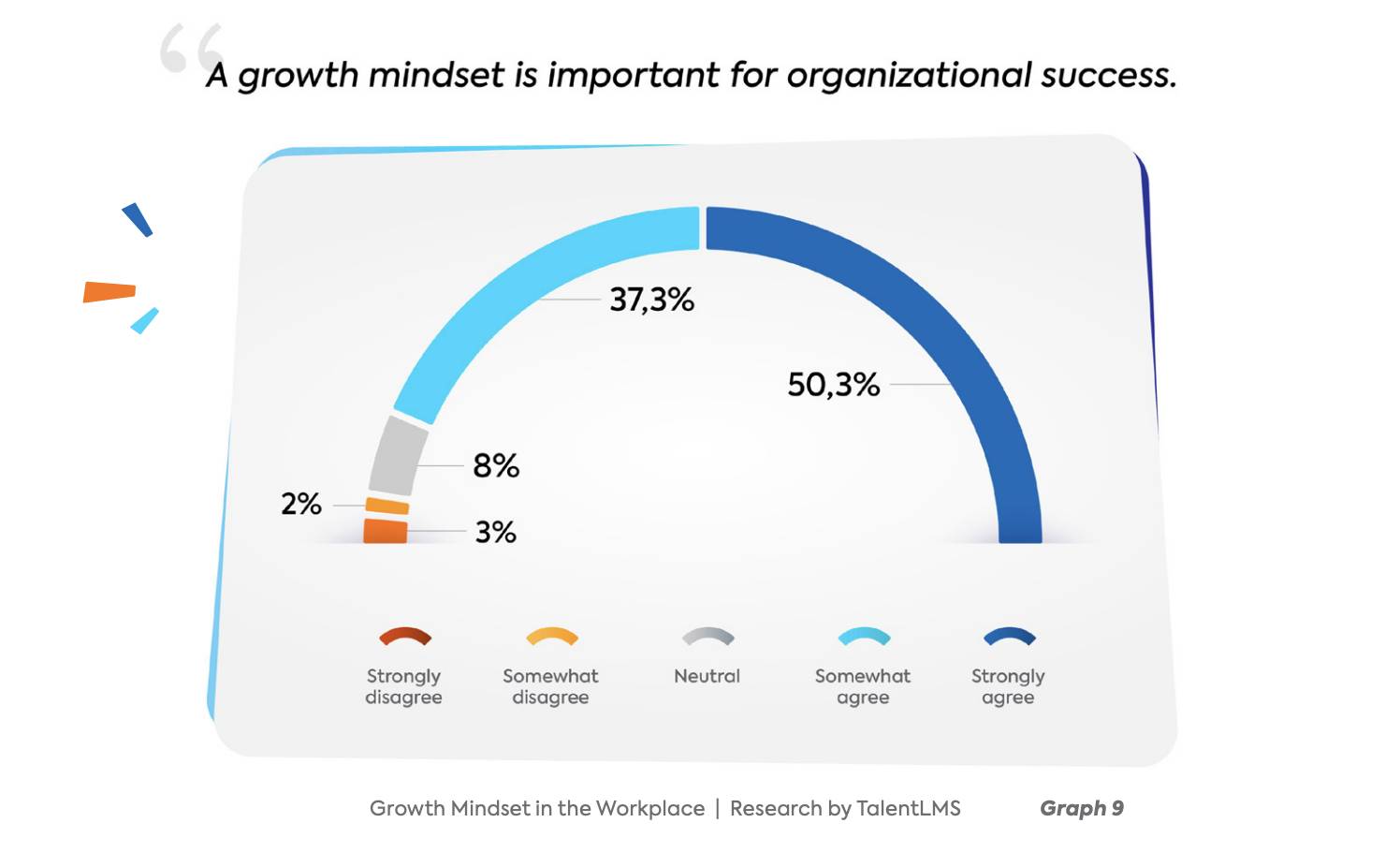
Meanwhile, a fixed mindset often hampers skills development.
In a study by Steve W. Martin of the University of Southern California Marshall Business School MBA Program, buyers rate two-thirds of sales reps as average or poor.
Martin believes underperforming reps lack the self-awareness to improve:
Looking closely at your sales process, you’ll notice that mindset affects reps’ behavior at every stage.
Here’s how reps with different mindsets react to common sales scenarios:
Facing challenging sales goals | Fixed mindset: Avoid challenging deals and customers for fear of failure. Don’t want to show shortcomings in their natural abilities. Growth mindset: Face tough sales targets head-on, knowing failure is the path to personal growth. |
Receiving constructive criticism | Fixed mindset: Take poor sales feedback personally, letting it affect their mental health. Often ignore advice and continue with existing outreach methods. Growth mindset: View criticism from the sales manager as a positive learning experience and a means to continue their personal development. |
Getting rejected | Fixed mindset: Negatively perceive a prospect’s rejection, internalizing failure as a reflection of their self-worth. Growth mindset: See failed sales deals as an opportunity to learn and grow. |
Handling objections | Fixed mindset: Consider sales objections as dead ends and back away quickly to avoid discomfort. Growth mindset: Welcome objections as opportunities to understand the buyer’s needs, refine responses and improve their sales skills. |
Trying a new sales strategy | Fixed mindset: Dismiss new sales approaches, preferring to stick with routines that feel safe but may not work. Growth mindset: Welcome new experiences to test, track results and refine their approach accordingly. |
Given the attitude of growth mindsets, it’s natural to want as many of them as possible on your team. Next, you’ll learn how to foster a growth mindset in your organization.
How to develop a growth mindset in your business
You can foster a growth mindset in your sales team by employing practical strategies that promote ongoing learning, experimentation and a positive outlook.
While some reps are blessed with a growth mindset, others need a little help reframing their perspective. The good news is you can do plenty to encourage a growth-focused outlook.
Here are seven strategies that help reps learn from experience, hit targets and grow their accounts.
1. Reframe what success and failure look like
A growth mindset sales culture thrives when you treat victories and setbacks as learning opportunities.
Success isn’t a given and failure isn’t final – it all depends on how reps behave and react.
Here are some tips to reframe success and failure in your business:
Share wins and lessons. Host weekly sales meetings where reps share one success and one lesson they’ve learned from a failed prospecting attempt. Spend time brainstorming how each rep can adapt their approach to win in the future.
Be transparent about your own failures. If you’re a sales manager or business owner, showing you’re still trying new things and learning from your failures will encourage your colleagues to do the same.
Run team- and activity-based competitions. Avoid pitting your team against each other by creating team or activity-based goals. You’ll show that success isn’t a winner-take-all outcome and failing doesn’t make you a loser. Instead, your team can win and grow together.
How Pipedrive can help
Regular note-taking within your customer relationship management (CRM) system helps reps consider how their actions or activities contribute to a deal’s success or failure.
If you’re a Pipedrive user, leverage the notes feature to jot down your thoughts after every closed deal.
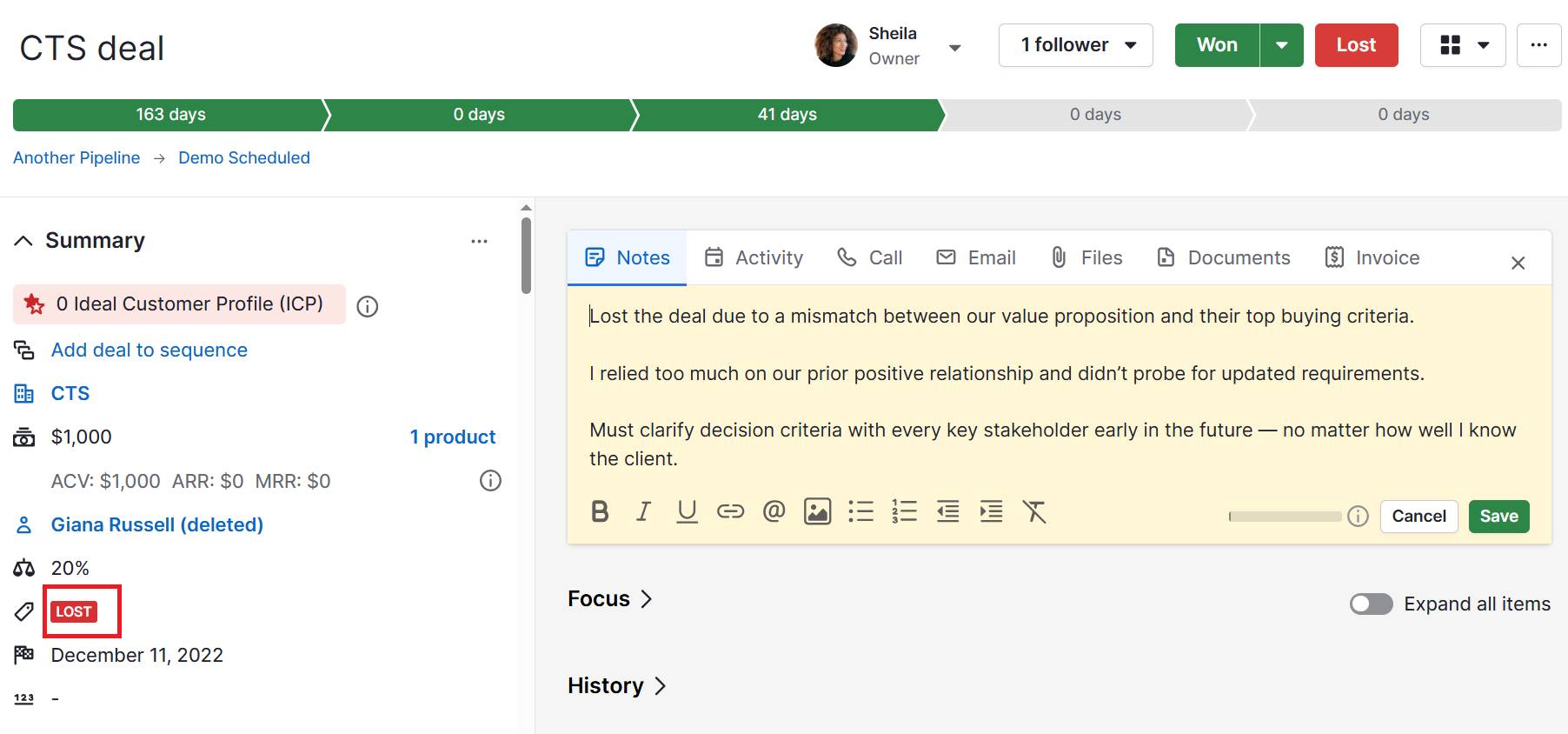
Add a keyword like “lesson” or “takeaway” to each note to make it easy to refer back to them in the future.
Doing this for every deal, not just closed sales, will encourage reps to view every failure as a way to learn and grow.
2. Offer constructive and actionable feedback
Regular employee feedback encourages a growth mindset by showing reps that improvement is always possible.
Weekly or bi-weekly one-on-ones are a great starting point, letting you deliver feedback frequently and privately.
Here are some tips to host a productive and motivational meeting:
Sandwich positive and constructive feedback. Mixing praise with feedback will help maintain high self-esteem and encourage reps to continue improving.
Show the path to progress. Rather than telling reps what’s wrong, show them how to improve. If you want them to try a new cold-calling script, for example, role-play scenarios with them first.
Praise efforts, not outcomes. Appreciate the actions and efforts of reps even when deals don’t materialize. Highlight everything they did well, like identifying the sales opportunity and running a great product demo.
Dive into real deals. Instead of discussing hypotheticals, open up your CRM system and work through recent deals to show prospects exactly how they can improve.
How Pipedrive can help
Pipedrive makes it easy to track rep activity in real time. Before each meeting, use the reports and insights feature to review each rep’s activity logs, deal progress and sales dashboards and personalize your feedback.
Here’s a typical sales dashboard in Pipedrive:
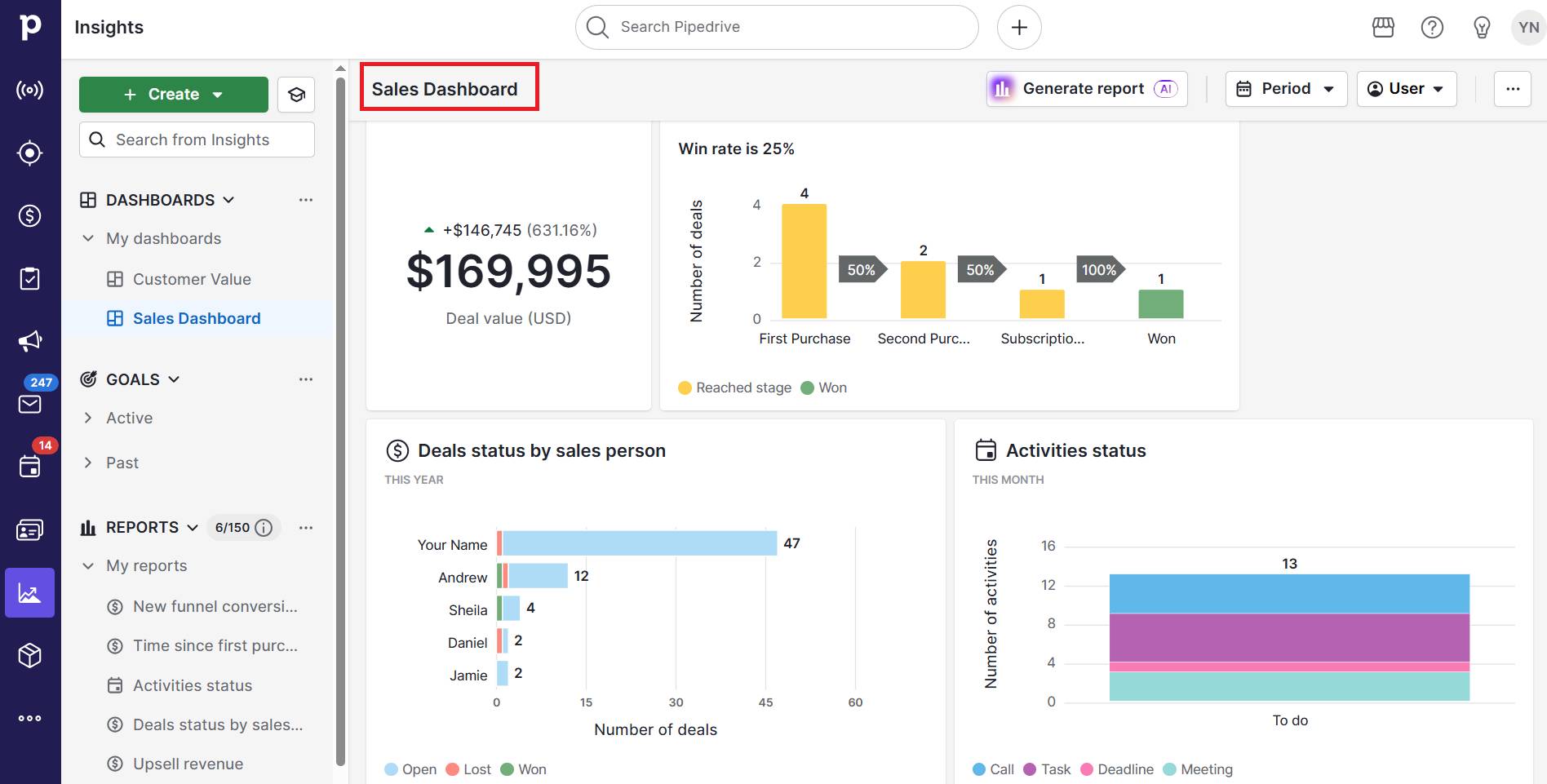
You can even schedule recurring feedback sessions in Pipedrive. Use the activity calendar and sync features to add external activities into your CRM so you never have to worry about finding time to meet.
3. Incentivize activity-based selling
Activity-based selling shifts the attention from uncontrollable outcomes to actions reps can directly influence – and rewards them accordingly.
Sales reps can’t control the outcome of a deal. That’s up to the buyer.
What reps can control is their call volume, the percentage of time they spend listening, the number of email follow-ups they send, their meeting prep and all the other activities that contribute to success.
How Pipedrive can help
Start incentivizing rep activities by tracking them with Pipedrive’s Goals feature. Set a goal based on the number of new activities added or the number marked complete:

Assign each sales rep different goals depending on their strengths and weaknesses. You can change the goal frequency, activity type and count.
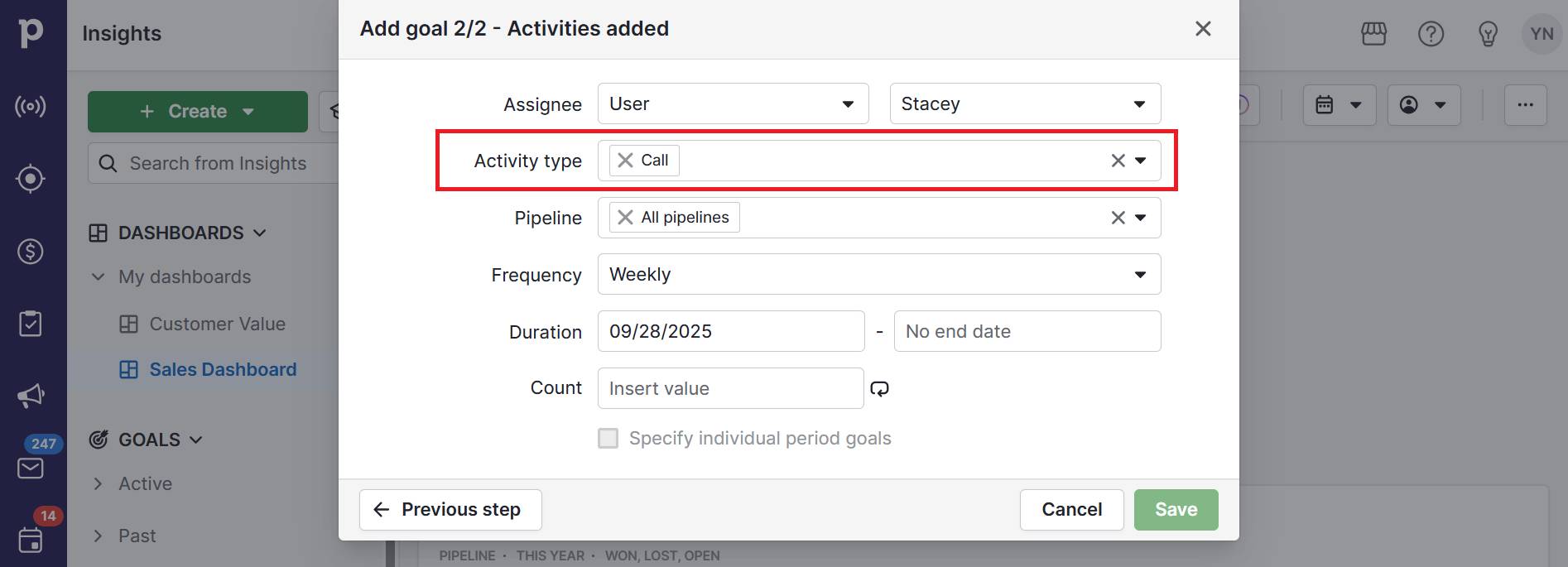
Track all of your team’s goals in a new sales dashboard to see everyone’s progress in one place. That way, you can offer advice and support before your next sales meeting.
4. Adopt a policy of continuous learning
A culture of continuous learning is almost synonymous with high-performing, growth-focused sales teams.
It creates an environment where reps continuously seek new knowledge, adapt to changes and build on their experiences.
There are many ways to deliver sales training, meaning every type and size of team can get the knowledge it needs. The table below summarizes the most common approaches:
Sales training programs | Pay for third-party training programs, online courses and workshops that teach new skills and proven sales methodologies for reps to incorporate into daily workflows. |
Coaching programs and tools | Create a structured sales coaching plan tailored to each rep’s strengths and weaknesses. Implement AI sales coaching tools that analyze sales data to deliver personalized guidance and performance insights that help reps close more deals. |
Sales mentorship | Run mentorship programs that let experienced team members pass their knowledge and sales advice to junior reps. It’s also good practice for sales reps who want to leap into management positions. |
Sales meetings | Hold regular meetings to educate reps on product updates, new buyer personas and innovative outreach approaches. |
Conferences and networking events | Encourage (and pay for) reps to attend industry events where they can learn from peers and prospective customers. |
If you’re hesitant to pay for expensive courses or coaching tools, consider the potential return on your investment. Even a slight increase in rep performance can generate positive ROI.
Plus, applicants will see your commitment to learning as a major job perk, making it easier to hire high-quality talent.
5. Use automation to free up your team
Automating sales processes allows your team to complete more sales activities and approach new challenges.
Automation also stops reps with a fixed mindset from using a lack of time as an excuse.
Here are some tasks you can automate with a CRM:
Drafting tailored messages with an AI email generator
How Pipedrive can help
Pipedrive’s workflow automation features let you automate administrative tasks like scheduling an activity when a deal moves to a new stage.
The automation templates make it easy to get started. You can find them by going to “...” (more) > Automation > Templates in your Pipedrive account:
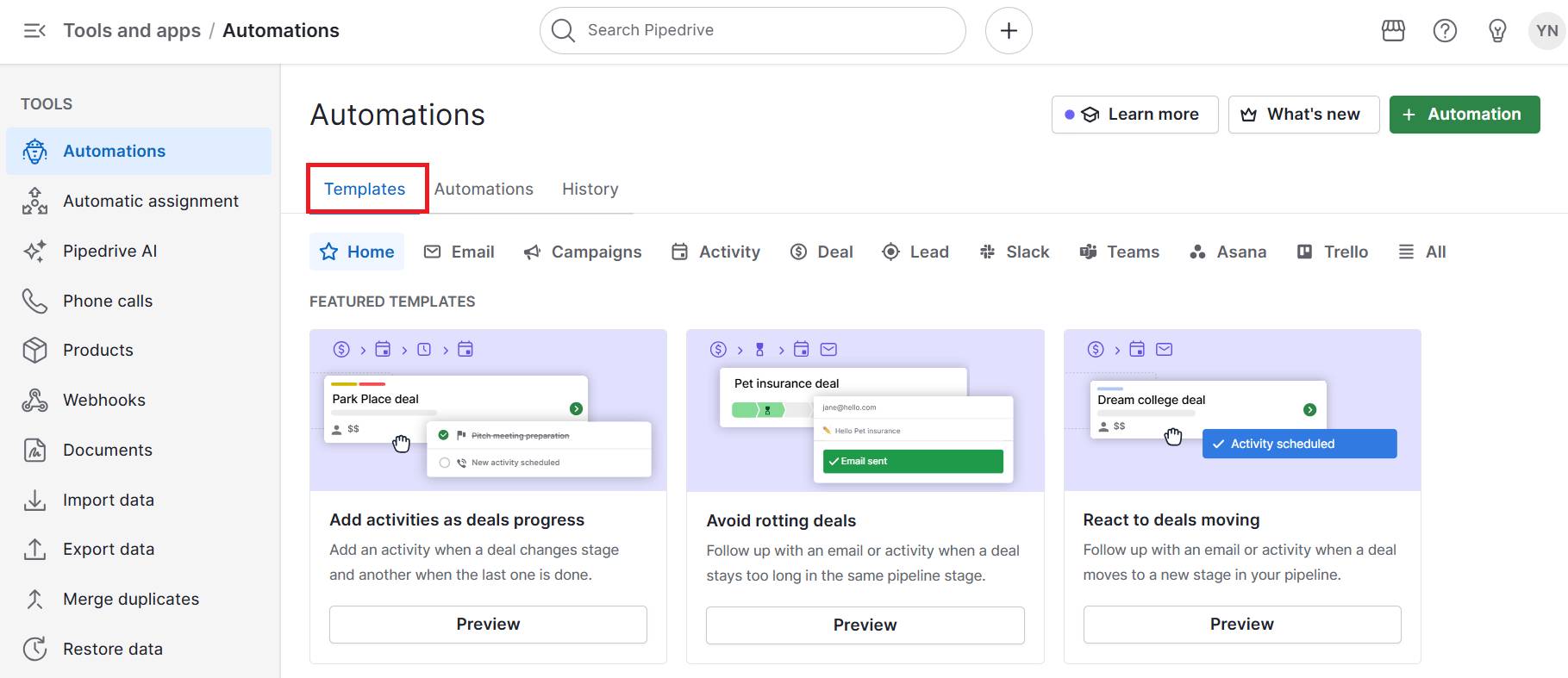
Click on “Templates“ to see over 30 ready-made automations like:
Adding products when existing deals move to a new pipeline stage
Following up when a deal has not changed stages for a certain time
Sending a message to your team when a deal moves to a new stage
Adding an item in an external app when a new deal appears
Emailing a welcome campaign to newly subscribed people
Select the process you wish to automate and then configure the automations to your needs.
Pipedrive in action: Blulinc, a mobility service provider (EMSP) and charge point operator (CPO), uses Pipedrive to automate its product management workflow.
By integrating Zapier with Pipedrive, Blulinc’s team has almost eliminated the need for manual data entry and saved around one-third of their time. As Blulinc founder Cihan Kranda explains:
“Most of the data is already automated between the platforms so they don’t have to type in twice or three times manually, which saves a lot of time that can be used to work on new projects or other tasks within the company that are late and need to be updated or worked on.”
6. Look for growth mindsets when hiring
Hiring salespeople with a growth mindset is much easier than trying to teach it.
Tweak your hiring process to find these reps by assessing each candidate’s mindset during the interview.
Here are some of the best sales interview questions to ask:
- What recent setback did you face at work and how did you handle it?
- Describe a recent skill you worked to improve. How did you approach the learning process?
- Describe a situation where you took a risk or tried a new strategy. What was the result?
- How do you respond if a prospect rejects your pitch?
- How do you stay updated with industry trends and sales techniques?
Interview best-case scenario: A candidate who turns setbacks into learning opportunities, takes initiative to build new skills and proactively seeks to improve results. They adapt quickly to feedback and consider challenges as a chance to grow.
You can also look for the following growth mindset traits in interviewees:
Openness to feedback | Actively seek constructive criticism and use it for improvement rather than taking it personally or ignoring it. |
Continuous learning | Show enthusiasm for learning new skills, adopting new processes and staying updated in their field. |
Resilience | Describe pushing through setbacks and persisting when faced with obstacles. |
Self-awareness | Can honestly assess their strengths and areas for improvement and articulate plans to address them. |
Goal orientation | Set goals for themselves and take deliberate action to achieve them, learning from successes and failures. |
Once you’ve hired a new sales rep, you’ll want to ensure they can succeed quickly. One of the best ways to do that is with a mentor.
Find the best new hires with this Sales Interview Checklist
7. Pair junior reps with senior team members
Creating a mentorship program where junior reps can learn from more experienced staff in an informal setting.
Mentorship is ideal for professional development. It can also help people with fixed mindsets to stop seeing others’ success as a threat and start viewing it as a positive learning opportunity.
Junior reps can also learn to overcome their fear of rejection by seeing how leaders deal with it on a day-to-day basis.
Here are some ways to encourage junior reps to learn from senior staff:
Shadowing. Have junior reps observe top performers when they make discovery calls, run sales demos and overcome objections.
Onboarding sessions. Assign a senior rep to mentor every new hire, even if the recruit is an experienced salesperson. You’ll help hires familiarize themselves with your sales methodology and internal processes while improving team camaraderie.
Deal reviews. Have mentors and mentees conduct post-mortem reviews of closed and lost deals to find what worked, what didn’t and key lessons in sales.
Rotate mentor-mentee pairings to expose new reps to different sales styles and fresh perspectives. This flexibility will also prevent the experience from becoming stagnant or routine.
Final thoughts
Sales teams with a growth mindset are more resilient, learn faster and close more deals.
You can foster the right mindset by encouraging activity-based selling, building a culture of continuous learning and giving reps constructive feedback.
Pipedrive simplifies tracking your team’s activities and automating routine tasks, allowing reps to spend more time improving their skills. Try it free for 14 days to start encouraging growth mindsets in your business.







